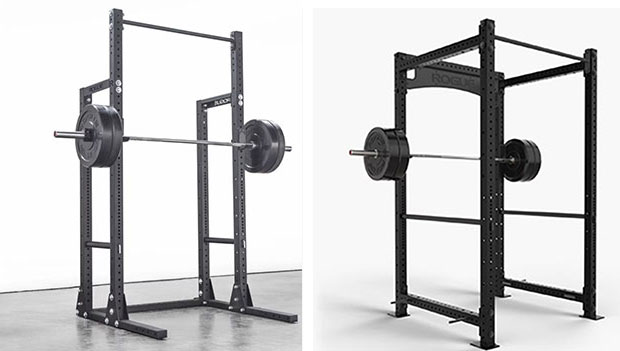
There are several debates about which type of equipment is better for training. Examples include barbells versus dumbbells, free weights versus machines, and squat racks versus power racks. The last example is a very important one for people creating a home gym. Which type of rack would be the best for strength training enthusiasts?
The answer depends on what your goals are and what you have planned for your home gym. Do you want to get stronger? Do you intend to use attachments? How much space and money can you commit to this rack? The combination of the answers to those questions and the guidance of the ACTIVE Reviews Team can help you learn more about the differences between the two types of racks and figure out the best recommendation for your personal set-up.
Why Trust Us?
ACTIVE.com's editorial team relies on the knowledge and experience of fitness and wellness experts including competitive athletes, coaches, physical therapists, nutritionists, and certified trainers. This helps us ensure the products we feature are of the highest standard. Collectively, the team has spent countless hours researching equipment, gear, and recovery tools in order to create the most accurate, authentic content for our readers. Customer satisfaction is also a key part of our review process, which is why we only feature products that are highly rated.
Squat Rack vs. Power Rack
By clicking on the product links in this article, we may receive a commission fee at no cost to you, the reader. Sponsorships and affiliate commissions help support our research so we can help you find the best products. Read the full affiliate disclosure here.
Squat Racks
Power Racks
What Is a Squat Rack?
A squat rack, also known in some circles as a half rack, has two uprights that are connected at the bottom. Some are also connected at the top by a crossbar that can double as a pull-up bar. These racks have several holes where you can place J-hooks and safety arms to your personal settings so you can perform the desired exercise.
The uprights are wide enough that you can set up for a squat by positioning your shoulders under the barbell. You can also fit a bench inside of the squat rack so you can perform exercises such as the bench press or seated shoulder press. Most racks also have safety arms that you can place so you can lower or drop the weight without serious risk of injury.
What We Like About Squat Racks
Squat racks are usually smaller than power racks, so they can be used in many home gyms that may have limited space. However, they can still support a lot of weight, which makes them a reliable piece of equipment for people who make strength training a priority. They are also a little more budget-friendly than power racks.
What We Don't Like About Squat Racks
The purpose that squat racks serve is very important, but it's also limiting. In other words, you can't do much else with a squat rack. Not many have storage sleeves for plates, you can't do many other exercises because of the lack of attachments, and they are less stable than the four-cornered racks.
SML- Rogue 70" Monster Lite Squat Rack
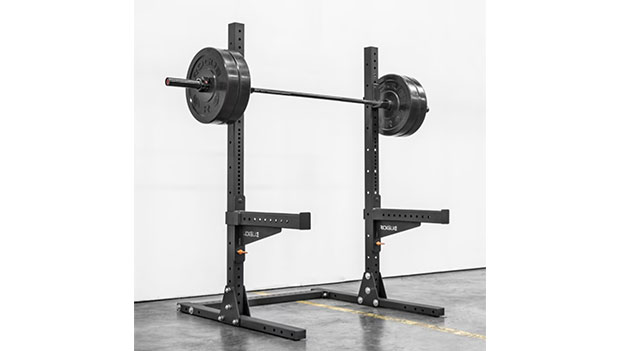
SPECS
- Size: 72" H, 49" W, 48" L
- Weight: 122 lbs.
-
Weight capacity: 1,000 lbs.
This squat rack by Rogue Fitness is similar to squat stands, but they are connected at the bottom, making it a much more stable option for barbell training. The 11-gauge steel will support weight for a long time to come. The size of the rack makes it a good choice for people training in small rooms.
The uprights are three inches by three inches with Westside hole spacing (one-inch apart), which means you can set the bar to a more specific height based on your training needs. Powerlifters and stronger lifters will find this choice will serve them well.
What We Like
- Very high weight capacity
- More holes for more specific settings
- Suitable for rooms with low ceilings
What We Don't Like
- No plate storage
- Safety arms are not included
BUY: SML- Rogue 70" Monster Lite Squat Rack
REP Fitness SR-4000 Squat Rack
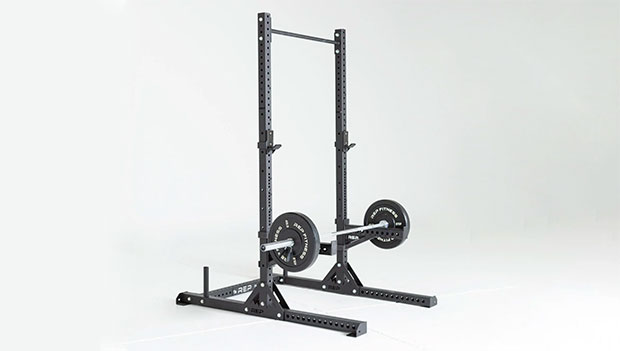
SPECS
- Size: 96" or 103" H, 52.4" W, 71.4" L
- Weight: 203-237 lbs.
- Weight capacity: 1,000 lbs.
This rack comes with two different heights, which could benefit taller lifters. The longer base on the bottom can increase the stability of the entire rack. The weight horns on the back of the rack can also help prevent the rack from moving when you return the weight to the J-hooks.
The crossbar at the top doubles as a pull-up bar, adding another basic and effective movement to your training arsenal. There are also holes on the sides of the uprights, allowing some of REP's attachments to be added to the rack. If you have a tall enough ceiling or prefer to train outside, then this could be a worthy addition to the workout space.
What We Like
- The crossbar can be placed at different heights
- Bottom of rack can be bolted down
- Weight horns double as plate storage
What We Don't Like
- 96" rack may not fit some rooms
- Not compatible with lat pull-down attachment
BUY: REP Fitness SR-4000 Squat Rack
Rogue HR-2 Half Rack
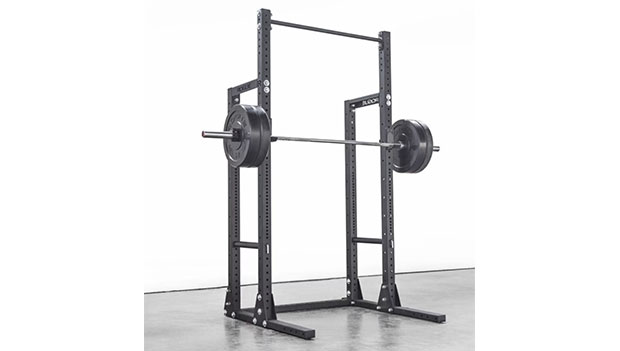
SPECS
- Size: 92" or 110" H, 48" W, 49" L
- Weight: 225-255 lbs.
- Weight capacity: Over 1,000 lbs.
This is technically a squat rack, but the back of the station provides similar stability to a full power rack. There is an extra 17 inches of space between the back uprights and the main uprights, which can be used for exercises such as the close grip bench press or rack deadlifts. It also has the capability of adding storage horns for plates or extra safety arms.
Thanks to those additional uprights, the rack doesn't have to be bolted to the floor. The pull-up bar at the top also comes standard, and you can loop bands onto that bar so you can do assisted pull-ups if you wish. It's very safe for beginners and has the capacity to support heavier weights for strength athletes.
What We Like
- 4 uprights instead of 2
- Extra stability and training space
- Appealing look and design
What We Don't Like
- Spotter arms for outside of rack not included
- Not compatible with many attachments
BUY: Rogue HR-2 Half Rack
What Is a Power Rack?
A power rack is also known as a full squat rack. These racks are larger and more sturdy than the basic squat rack. That's because of the four uprights that are all connected with crossbars, thus making the rack more like a box or a cage, which is another nickname for this type of squat rack.
Power racks are also more versatile than basic squat racks. You can perform exercises both within the middle of the rack or on the outside. Beginners can feel more comfortable training inside a power rack because of the extra sides and connection points.
What We Like About Power Racks
A power rack is more solid, can typically support heavier weights, and they are considered safer because the safety arms are connected on both sides instead of one side. Power racks also may be able to support more attachments and accessories than the basic squat rack.
Most power racks also have stronger crossbars, which can double as pull-up bars. You can also feel safe resting heavy poundages directly on the spotter arms, so you can perform exercises such as barbell shrugs and hang cleans.
What We Don't Like About Power Racks
There aren't many downsides to power racks, but they do take up more space than their squat rack counterparts. So, you have to make sure the room you're using will support it. They also require more materials, which means they will cost more money. Most power racks are also taller, so they may not fit in rooms with lower ceilings.
REP Fitness PR-1000 Power Rack
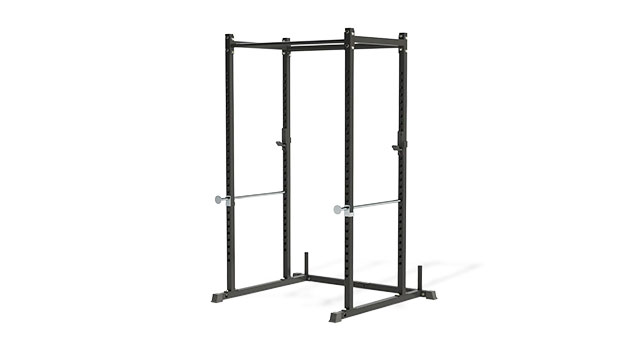
SPECS
- Size: 83.63" H, 58" W. 48" L
- Weight: 133 lbs.
- Weight capacity: 700 lbs.
This could be a dependable choice for beginners who want to start a simple home gym. There is nothing fancy about this rack, which makes it simple to assemble and use. It is made of 14-gauge steel, with one-inch holes spaced two inches apart. The holes on the uprights are numbered for easier tracking of settings for each exercise you set up for inside this rack.
The J-hooks are covered with extra plastic to protect your barbell as well as the hooks themselves. This allows you to focus on unracking and re-racking the barbell safely without fear of damage to your equipment.
What We Like
- 2 different grips for crossbars for pull-ups
- Weight horns for stability and weight storage
- Spotter arms extend outside of the rack
What We Don't Like
- The spotter arms have no covering on them
- Can't be bolted down
BUY: REP Fitness PR-1000 Power Rack
Force USA MyRack Modular Power Rack
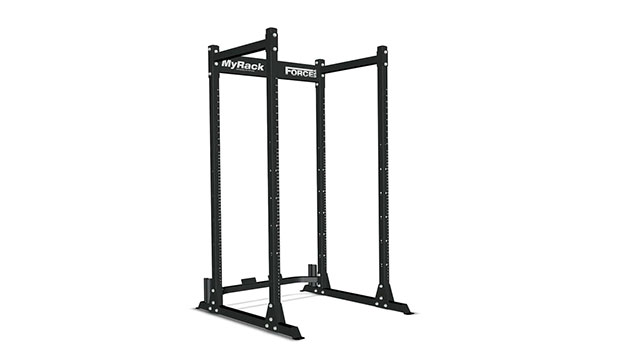
SPECS
- Size: 87" H, 47" W. 55" L
- Weight: 216 lbs.
- Weight capacity: 2,000 lbs.
This is a very durable rack that will withstand a lot of force and training. Force USA offers a lot of compatible additions to help you make a personalized rack with the attachments you feel you need. They come at an extra cost, but this could save you money in the long run because you won't need to buy extra machines.
They also offer a limited lifetime structural warranty, which isn't common with squat racks. It's also a little over seven feet tall, which is beneficial for shorter users or those with low ceilings. Users of all fitness disciplines can benefit from having this rack available to train with.
What We Like
- 54 adjustment points
- Supports up to 20 different attachments
- Can be bolted or freestanding
What We Don't Like
- May be too short for taller users
- Holes are not numbered
BUY: Force USA MyRack Modular Power Rack
Rogue Rml-490C Power Rack 3.0
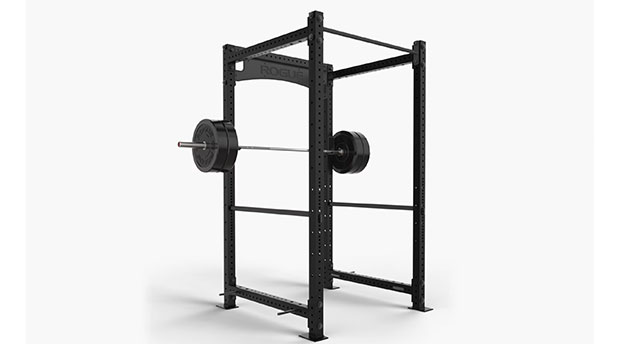
SPECS
- Size: 90.375" H, 49" W. 49" L
- Weight: 340 lbs.
- Weight capacity: 1,000 lbs.
Fitness enthusiasts who like to use both plates and bands on their barbells will find this power rack to be a great investment. There are two pegs on each side so you can train with bands on either side of the rack. There is one-inch spacing on the uprights in the spaces that you would bench, with two inches of space between holes throughout the rest of the rack.
The extra colors allow you to personalize this rack to fit the design you have in mind for your home gym. The inside of the rack offers 43 inches of space for you to perform any exercise you wish without the concern of hitting the uprights. It won't require as much space as other racks might.
What We Like
- Available in 10 different colors
- Spotter arms have covering
- Band pegs for additional resistance
What We Don't Like
- Only 1 pull-up bar included
- Satin clear finish will show blemishes
BUY: Rogue Rml-490C Power Rack 3.0
FAQs About Squat Racks vs. Power Racks
Is a power rack better than a squat rack?
It depends on the size of your home gym and what your fitness goals are. If you have a smaller space to train, then a basic squat rack would serve the purpose while maximizing the space you have committed to training. If you have a larger workout area and training heavy is a priority, then a power rack would be the way to go.
Are power racks safer than squat racks?
The power rack is designed to maximize safety for the lifter because you can perform the lifts inside the four uprights of the power rack with the safety arms connected on both sides. Most power racks will also support more weight than their squat rack counterparts.
The squat rack can still be a safe tool to use, you just need to have the safety arms set properly, and it should be either bolted down or weighed down for extra stability and support. If a squat rack is the best you can have for your home gym, you can still train safely and effectively with those standards.
Can you squat with a power rack?
You definitely can squat with a power rack. You should be able to set the J-hooks to unrack and re-rack the barbell at the perfect height for you, and you can set the safety arms so if you get stuck at the bottom of the lift, you can dump the weight with minimal risk of injury. You can squat outside of the power rack, but squatting inside the four uprights is the safest way to perform the exercise.


